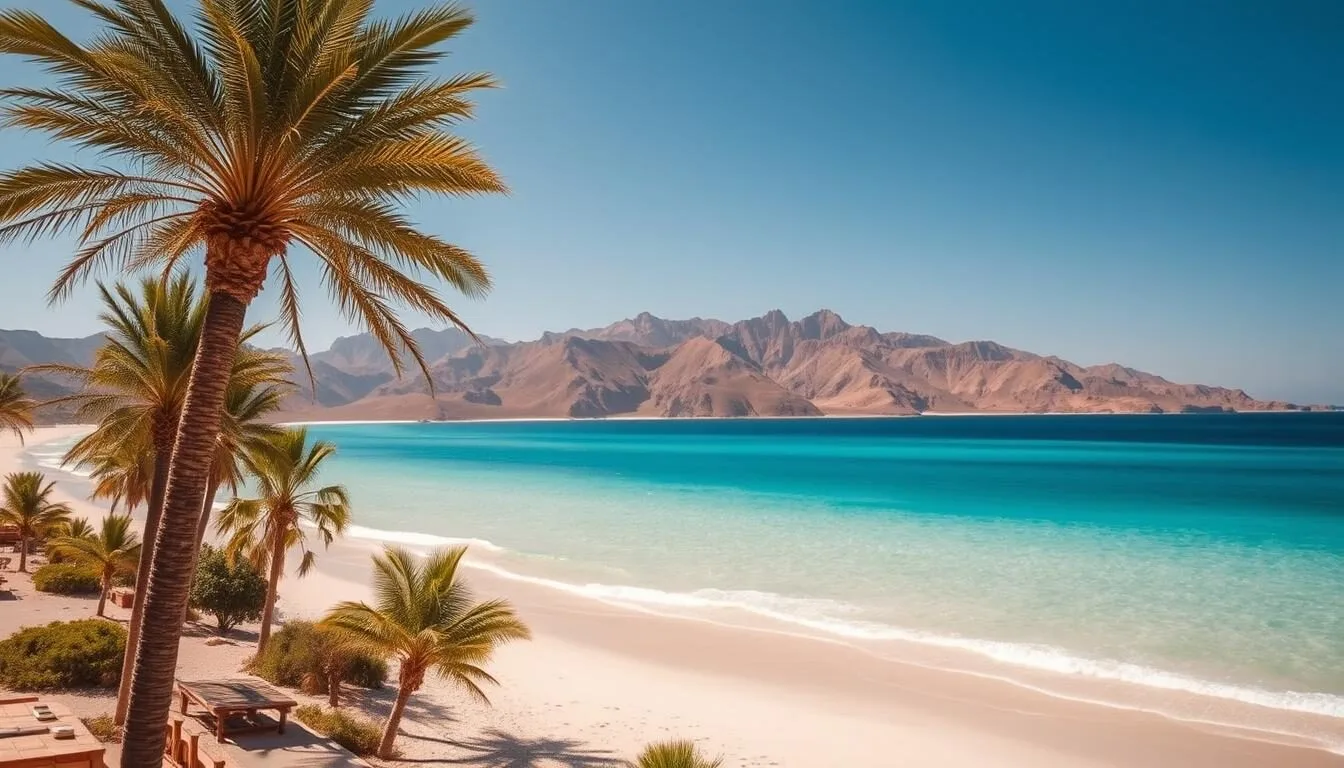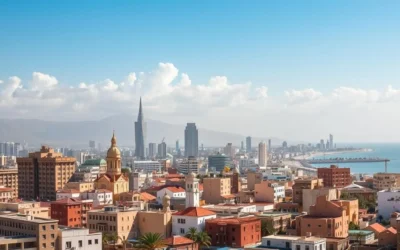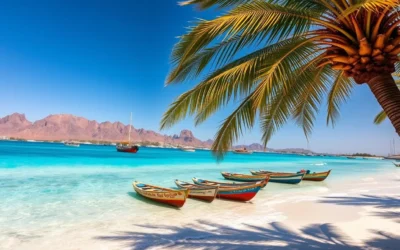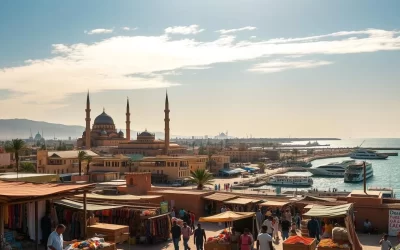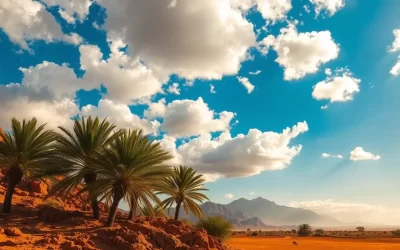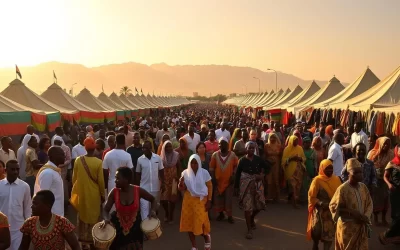✓ Accommodations✓ Flights✓ Rental Cars
Nestled in the Horn of Africa, Djibouti is a hidden gem that offers a unique blend of cultures, breathtaking landscapes, and unforgettable experiences. With its strategic location at the junction of the Red Sea and the Gulf of Aden, this small country is a treasure trove of natural wonders.
Imagine floating in the salty waters of Lake Assal or swimming with whale sharks in the Bay of Ghoubet. Djibouti promises an array of exciting experiences that cater to adventure seekers, nature lovers, and cultural enthusiasts alike. As you explore this destination, you’ll discover the top places to visit, from volcanic landscapes to vibrant cultural hubs.
Get ready to uncover the country’s top attractions and make your travel bucket list a reality.
Discovering the Hidden Gem of the Horn of Africa
In the heart of the Horn of Africa lies Djibouti, a hidden gem brimming with cultural and natural wonders. This small nation is a treasure trove of unique experiences that will leave you in awe.
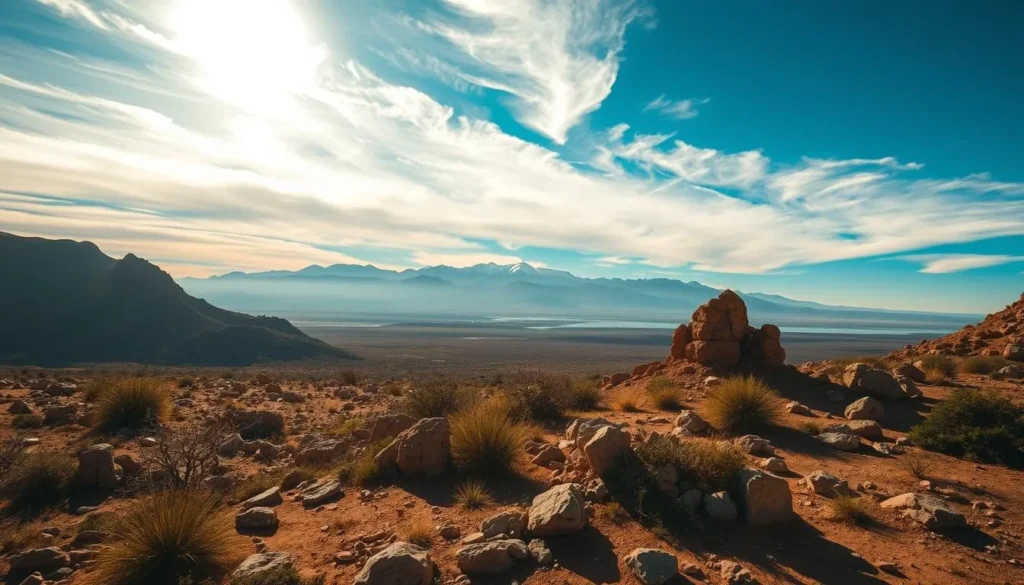
Why Djibouti Should Be on Your Travel Bucket List
Djibouti is a destination that offers a diverse array of activities and sights. When you visit Djibouti, you’ll be treated to vibrant French colonial architecture in the capital city, while also having the opportunity to meet the Afar people, who have lived in this region for centuries.
| Experience | Description |
|---|---|
| Explore Lake Assal | Float in the hypersaline waters and marvel at the stunning landscapes |
| Swim with Whale Sharks | Encounter majestic whale sharks in the Bay of Ghoubet |
| Discover Rock Art | Unveil Djibouti’s prehistoric heritage at Abourma |
A Unique Blend of Cultures and Landscapes
Djibouti’s stunning landscapes range from salt flats to volcanic formations, lush forests, and pristine beaches, making it a place that feels like another world. The country’s unique cultural tapestry is woven from African, Arab, and French influences, creating a rich and fascinating cultural identity.
With its diverse landscapes and cultural heritage, Djibouti is an ideal destination for travelers seeking authentic experiences. Whether you’re interested in history, culture, or adventure, Djibouti has something to offer.
Float in the Hypersaline Waters of Lake Assal
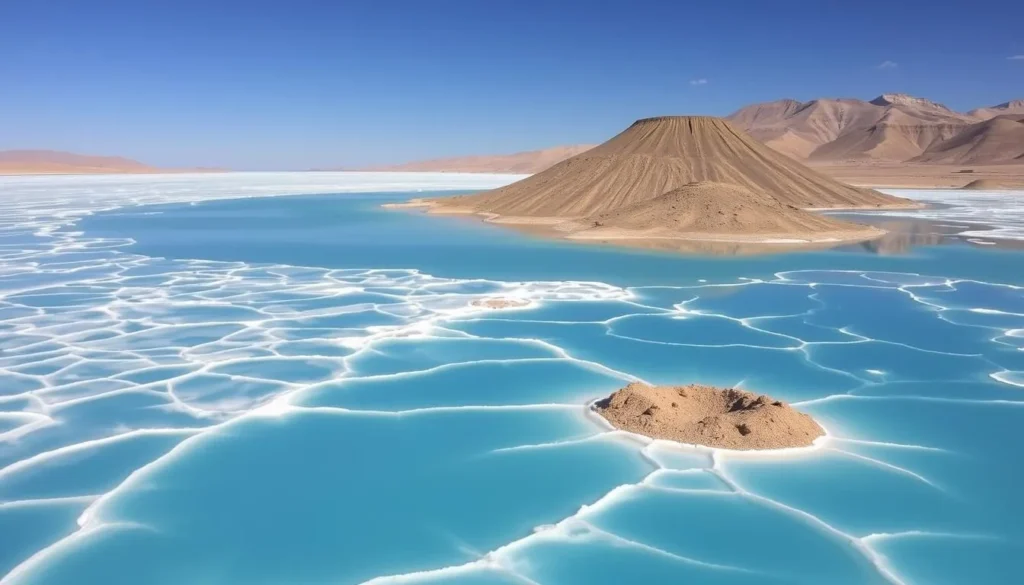
Imagine floating effortlessly in the hypersaline waters of Lake Assal, surrounded by a surreal landscape of salt crystals and volcanic formations. At 155 meters below sea level, Lake Assal is the lowest point in Africa and one of the saltiest bodies of water in the world.
Experiencing the Lowest Point in Africa
You’ll be amazed by Lake Assal, a natural wonder that sits at 155 meters below sea level. The lake’s hypersaline waters contain 10 times more salt than the ocean, creating a unique environment where you can float like a cork. The salt deposits around Lake Assal have been harvested by the local Afar people for centuries, and you might witness traditional salt caravans that still operate today.
A Surreal Landscape of Salt Crystals and Volcanic Craters
The stunning landscape around the lake features a palette of colors ranging from turquoise waters to white salt flats and dark volcanic formations, creating a photographer’s paradise. You can take a dip in the mineral-rich waters, known for their therapeutic properties, though you’ll want to bring fresh water to rinse off afterward. Lake Assal is not just a beautiful place to visit but also an important economic resource for Djibouti, with salt extraction being one of the country’s oldest industries.
The experience of visiting Lake Assal is truly unique, with its stunning landscapes and rich cultural heritage. As you explore this natural wonder, you’ll be struck by the dramatic contrast between the white salt crystals and the black volcanic rocks. The lake’s salt level is comparable to the Dead Sea, making it a fascinating destination for those interested in exploring one of the world’s most extreme environments.
Swim with Majestic Whale Sharks in the Bay of Ghoubet

Djibouti offers an unparalleled opportunity to swim with majestic whale sharks in the Bay of Ghoubet. This experience is a must for any marine enthusiast or adventure seeker. The Bay of Ghoubet is known for its rich marine life, making it an ideal location for encountering these gentle giants.
The Best Time and Places for Whale Shark Encounters
The best time to see whale sharks in Djibouti is between November and February. During this period, the warm waters of the Gulf of Tadjoura attract these magnificent creatures. Tour operators like Dolphin Excursions offer guided tours to the best spots, ensuring a high chance of sightings.
Some key points to consider for whale shark encounters include:
– You’ll have the incredible opportunity to swim alongside whale sharks, the gentle giants of the ocean and the world’s largest fish, in the Bay of Ghoubet.
– The best time for whale shark encounters in Djibouti is between November and February.
– Unlike other shark destinations, Djibouti offers almost guaranteed sightings during the season.
– When swimming with whale sharks, you’ll be amazed by their size (up to 40 feet long) and gentle nature.
– Tour operators provide expert guides who understand shark behavior.
– You don’t need to be an experienced swimmer or diver to enjoy this activity.
– Remember to maintain a respectful distance and never touch the whale sharks.
Tips for an Unforgettable Swimming Experience
To make the most of your encounter with whale sharks, it’s essential to be prepared. Snorkeling gear is typically provided by tour operators, but you should check with your tour provider. Maintaining a safe distance from the whale sharks is crucial, both for your safety and the well-being of these protected marine animals.
By following these guidelines and choosing a reputable tour operator like Dolphin Excursions, you can have a memorable and responsible encounter with the marine life in the Bay of Ghoubet.
Discover 7,000 Years of Rock Art at Abourma
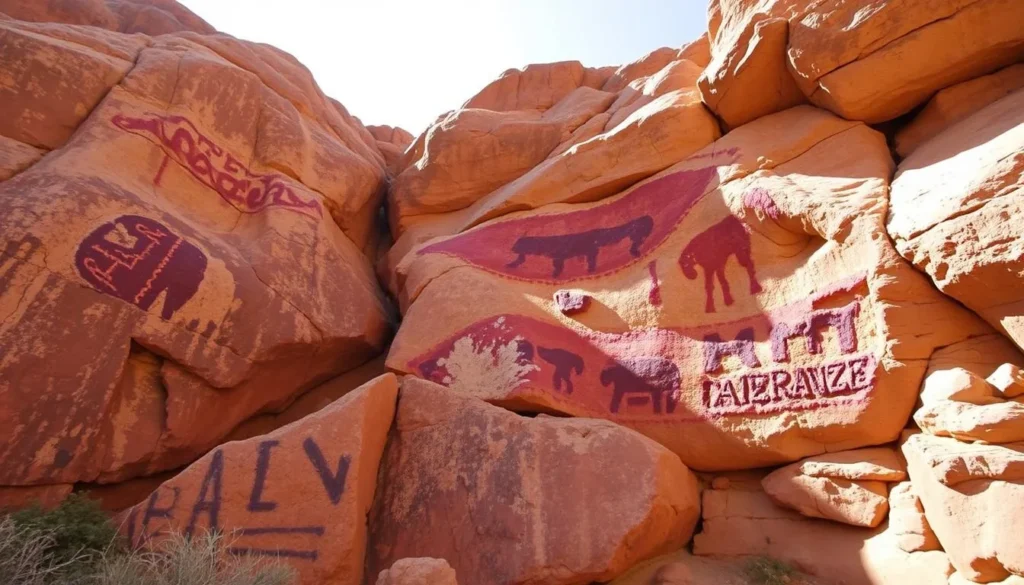
Uncover the secrets of Djibouti’s past at the Abourma Rock Art Site, home to some of the most significant prehistoric rock art in the Horn of Africa. Located in the northern part of the country, this site is a must-visit for anyone interested in history and archaeology.
Unveiling Djibouti’s Prehistoric Heritage
The Abourma Rock Art Site is a treasure trove of prehistoric paintings, depicting wildlife such as giraffes, antelopes, and ostriches. These ancient petroglyphs and paintings, dating back around 7,000 years, provide a fascinating glimpse into the lives of the people who once inhabited this region.
- You’ll be transported back in time when you visit the Abourma Rock Art Site, located in the northern part of the country and home to some of the most significant prehistoric art in the Horn of Africa.
- Dating back 7,000 years, these ancient petroglyphs and paintings depict wildlife that once roamed the region, including giraffes, antelopes, and ostriches, providing a fascinating glimpse into Djibouti’s prehistoric past.
- Your trip to Abourma requires a four-wheel-drive vehicle and preferably a knowledgeable guide who can help interpret the significance of the various art panels scattered across the rocky outcrops.
As you explore the site, you’ll gain insight into the lives, beliefs, and hunting practices of the ancient peoples who inhabited this region thousands of years before recorded history. The journey to Abourma itself is an adventure, taking you through rugged landscapes and remote areas that few visitors to Djibouti ever get to experience.
Relax on the Pristine Shores of Les Sables Blanc
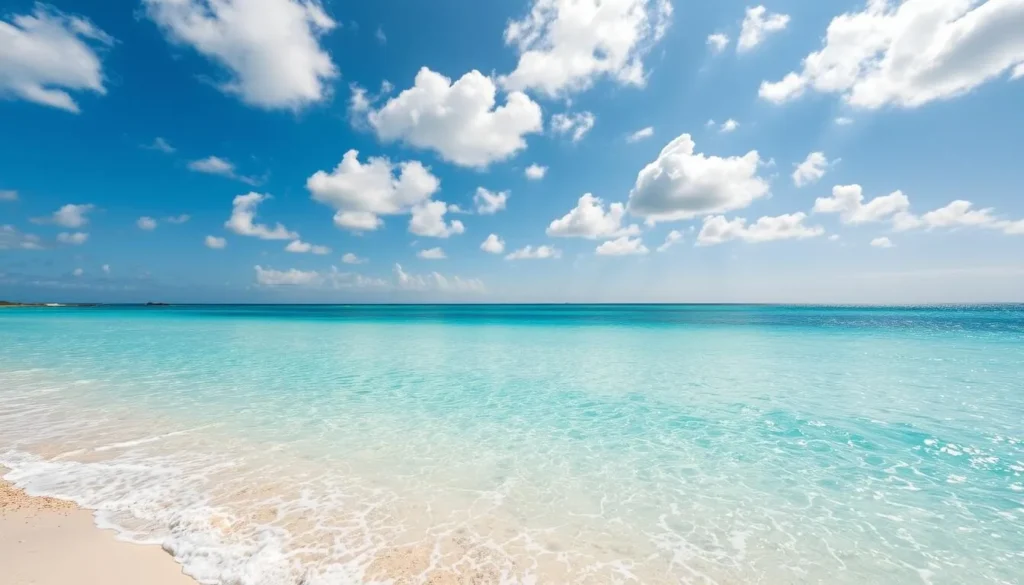
Les Sables Blanc, meaning “White Sands,” is a breathtaking beach destination along Djibouti’s Red Sea coast. This paradise offers a perfect escape from the heat and bustle of the city, with its pristine white sand beach contrasting beautifully with the turquoise waters of the Red Sea.
A Tropical Haven with Rich Marine Life
The calm, clear waters of Les Sables Blanc provide excellent visibility, making it an ideal spot for diving and snorkeling. You’ll discover vibrant coral reefs teeming with marine life, including colorful fish and sea turtles.
Some of the top experiences at Les Sables Blanc include:
- Relaxing on the beach and enjoying the peaceful atmosphere and stunning views across the Red Sea to Yemen’s shores in the distance.
- Renting kayaks to explore the coastline and discovering hidden spots along the way.
- Savoring fresh seafood at local restaurants near the beach, caught daily from the Red Sea.
- Snorkeling or diving to explore the underwater world and observe the rich marine life up close.
Les Sables Blanc is accessible as a day trip from Djibouti City, but consider staying overnight at nearby accommodations to fully appreciate the tranquility of this coastal paradise.
Explore the Day Forest National Park
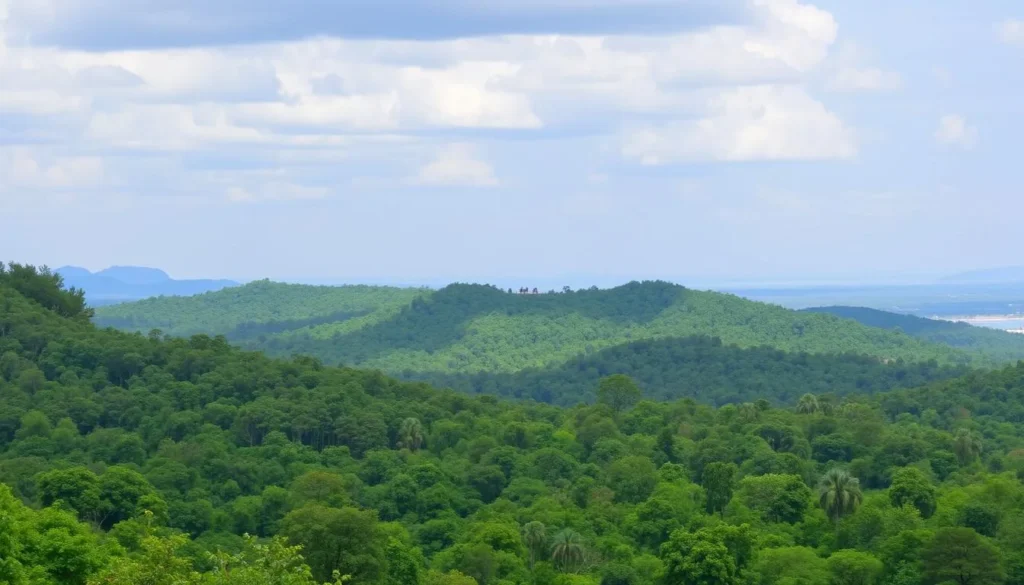
Nestled in the Goda Mountains, the Day Forest National Park is a haven for nature lovers and adventure seekers. Located about 20 kilometers from the coast, this national park is a unique blend of flora and fauna, standing in stark contrast to the arid landscapes that dominate much of Djibouti.
Wildlife Watching and Hiking in Djibouti’s Green Oasis
As you explore the Day Forest National Park, you’ll encounter diverse wildlife including various bird species, small mammals, and if you’re lucky, the rare Djibouti francolin, a bird species found nowhere else in the world. The park offers several hiking trails that take you through dense juniper forests, providing welcome shade and cooler temperatures compared to the lowlands.
The forest national park is home to over 175 bird species, making it a paradise for birdwatchers and nature photographers. The park also plays a crucial role in preserving Djibouti’s biodiversity and serves as an important watershed for the surrounding region.
Savor the Flavors of Djibouti’s Diverse Cuisine
As you explore Djibouti, you’ll discover a rich culinary heritage that blends African, Arab, and French influences. The country’s cuisine is a reflection of its strategic location and cultural diversity, offering a unique gastronomic experience.
A Blend of Flavors and Cultures
Djibouti’s food scene is characterized by its diverse influences, resulting in a mix of spicy stews and delicate seafood dishes. The national dish, Skudahkharis, is a lamb stew flavored with cardamom and spices, served with rice. This dish showcases the country’s African and Arab roots.
When dining in Djibouti City or throughout the country, you’ll encounter a variety of culinary experiences. French colonial influence is evident in the capital city’s culinary scene, particularly in French-inspired seafood dishes using fresh catches from the Red Sea.
| Dish | Description | Influence |
|---|---|---|
| Skudahkharis | Lamb stew with cardamom and spices, served with rice | African, Arab |
| Mukbaza | Fish dish prepared with honey, dates, and bananas | Local Specialty |
| Sambussas | Similar to samosas, a popular street food | Arab, Indian |
Sampling street food is one of the most authentic culinary experiences in Djibouti, with favorites like sambussas and banana fritters offering a taste of everyday life in this vibrant country. Coffee also plays an important role in Djibouti’s food culture, with the traditional coffee ceremony being both a delicious beverage and a social ritual worth experiencing.

For a truly memorable meal, seek out places serving mukbaza, a unique fish dish that exemplifies Djibouti’s distinctive approach to combining sweet and savory flavors. Restaurants in Djibouti often serve a mix of Ethiopian, Somali, and Yemeni dishes alongside local specialties, reflecting the country’s position as a cultural melting pot.
Explore the Unique Francophile City of Djibouti
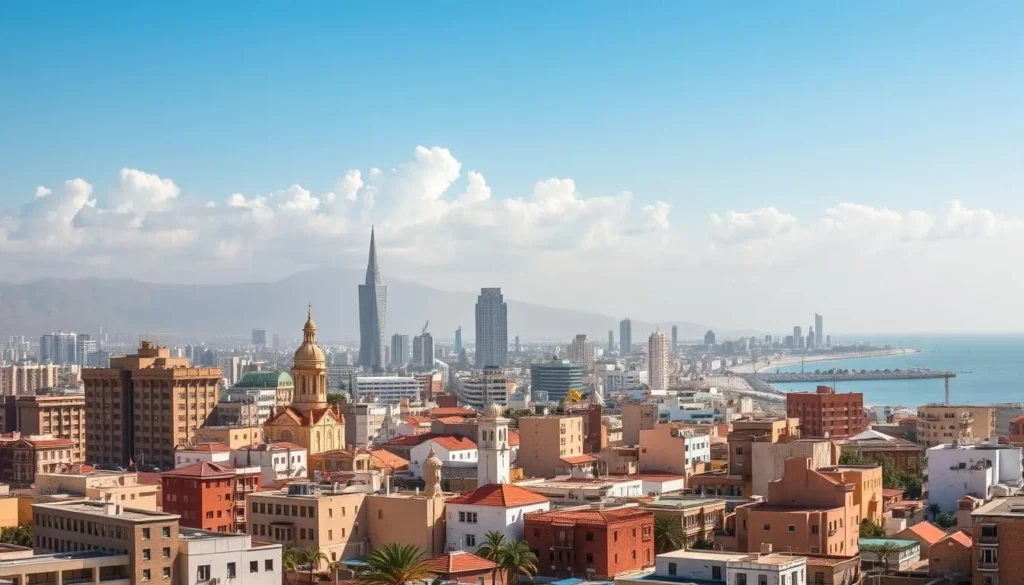
As you step into Djibouti City, you’ll be greeted by a unique blend of cultures that’s hard to find anywhere else in the world. The capital city is a fascinating mix of European and African influences that will captivate any visitor.
A Blend of European and African Architecture and Culture
You’ll be charmed by Djibouti City, the capital and largest urban center in the country, where French colonial influence blends seamlessly with African traditions. As you wander through the European Quarter, you’ll notice the distinctive French architecture, wide boulevards, and sidewalk cafés that give parts of the city a distinctly Mediterranean feel.
The central market, Marché Central, offers one of the most authentic cultural experiences, where you can browse stalls selling everything from fresh produce to traditional crafts. Djibouti City’s Place Mahmoud Harbi serves as the heart of the capital, surrounded by important buildings including the presidential palace and national theater.
Approximately 50% of the city’s population speaks French, a legacy of the colonial period that continues to influence the capital’s cultural landscape. The contrast between the European-style city center and the more traditional African neighborhoods provides fascinating insights into the country’s complex history and cultural identity. Don’t miss visiting the city’s mosques, particularly the Hamoudi Mosque with its striking minaret, which represents the important Islamic influence in Djibouti City and throughout the country.
Adventure in the Goda Mountains
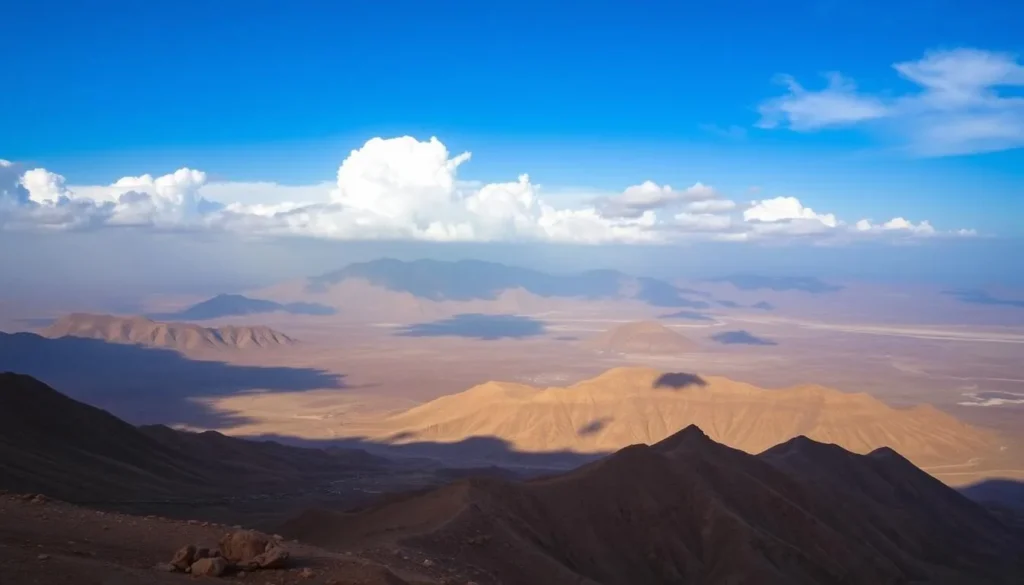
Adventure awaits in the Goda Mountains, where hiking trails and stunning landscapes converge. The Goda Mountains are a haven for outdoor enthusiasts, offering a unique blend of adventure and natural beauty.
Hiking Trails and Breathtaking Panoramic Views
The Goda Mountains are one of the most rewarding places for outdoor adventures in Djibouti, providing a welcome respite from the heat of the lowlands. Rising to heights of over 1,700 meters, the Goda Mountains provide some of the most stunning landscapes in the country, with panoramic views stretching all the way to the Gulf of Tadjoura on clear days.
The mountain range offers various hiking trails suitable for different fitness levels, from gentle walks through forested areas to more challenging treks to the highest peaks. As you explore the Goda Mountains, you’ll encounter unique flora and fauna that thrive in this microclimate, including rare bird species and plants that can’t be found elsewhere in the country.
Adventure seekers can arrange guided multi-day treks through the mountains, staying in small villages along the way and experiencing the hospitality of the local mountain communities. Make sure to bring plenty of water, sun protection, and appropriate footwear when hiking in the Goda Mountains, as facilities are limited and the terrain can be challenging.
The mountains are also home to several traditional Afar villages where you can learn about the pastoral lifestyle that has sustained people in these highlands for generations, making the Goda Mountains a truly enriching destination for adventures and cultural experiences.
Practical Information for Visiting Djibouti, Djibouti: Best Things to Do – Top Picks
When planning your trip to Djibouti, it’s essential to consider the best time to visit. Djibouti’s climate varies significantly throughout the year, impacting the quality of your trip.
Best Time to Visit and Getting Around
The best time to visit Djibouti is between November and February, when temperatures are relatively cooler, ranging from 80-90°F, and humidity levels are lower. This period coincides with whale shark season, making it ideal for swimming with these gentle giants. Avoid visiting during the summer months (May to September) when temperatures often exceed 100°F. For getting around, you can use taxis in Djibouti City or rent a 4×4 vehicle with a driver to explore attractions outside the capital. Plan your daily activities for early morning or late afternoon to avoid the intense midday heat.
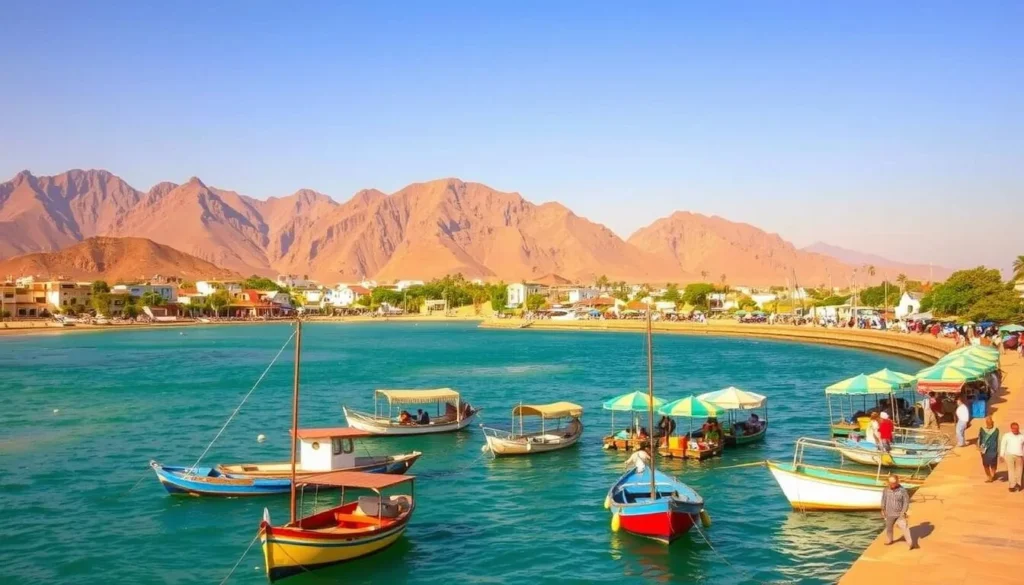
Health and Safety Tips for Travelers
To ensure a safe and healthy trip, make sure to drink only bottled water, use insect repellent, and have appropriate travel insurance that covers medical evacuation. While Djibouti is generally safe for tourists, it’s advisable to check current travel advisories before your trip. Be aware that photography of military installations and government buildings is strictly prohibited. By taking these precautions, you can enjoy a smooth and enjoyable journey to Djibouti.
Conclusion
For travelers seeking a truly unique experience, Djibouti is an ideal destination that promises to leave a lasting impression. As you’ve discovered, this country offers a diverse array of places to explore, from the hypersaline waters of Lake Assal to the vibrant city life of its capital.
When you visit Djibouti, you’ll have the opportunity to engage in various travel activities, such as diving among coral reefs in the Red Sea or exploring the unique landscapes. This trip will be filled with unforgettable experiences, making it a perfect addition to your travel bucket list.
To make the most of your trip, make sure to plan it during the best time to visit (November to February) for optimal travel conditions. Djibouti’s small size allows you to experience many of its highlights in a single visit, but you’ll likely want to return to explore more of this fascinating destination in the world.
The above is subject to change.
Check back often to TRAVEL.COM for the latest travel tips and deals.
